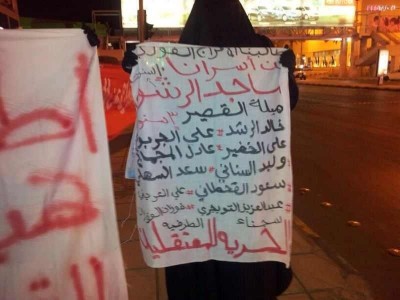Blogging for Freedom on Saudi Arabia's National Day
Saudi Arabia marks its National Day on September 23. While this is usually a day people celebrate the monarchy more than the country itself, the previous two national days were different. Saudis, with the use of social networks and blogs, had the chance to express themselves freely – blogging their hopes for a nation which respects and embraces its people and their aspirations.
Writer and Doctor, Bader Al-Ibrahim wrote:
لا يكفي الاحتفال الكرنفالي لتعزيز الانتماء الوطني في غياب ذاكرة جماعية وهوية مشتركة ومؤسسات ترعى المواطنة #اليوم_الوطني
— بدر الإبراهيم (@Baderalibrahim) September 23, 2013
The carnival celebration is not enough to reinforce the national sense of belonging in the absence of a popular memory, a joint identity and institutions sponsoring citizenship.
Jordanian Human Rights Defender, Fadi Al-Qadi, tweeted:
عبد الله الحامد ورفاقه في #حسم يقضون #اليوم_الوطني_السعودي في السجن. احد التهم الموجهة “تعطيل التنمية”. اما تهمة الحاكم فهي “تعطيل البشرية”
— Fadi Al-Qadi (@fqadi) September 23, 2013
Abdullah Al-Hamed and his fellows in ACPRA are spending the Saudi national day in prisons. One of their charges is “impeding development” while the ruler's charge is “impeding humanity”.
Writer Abdullah Al-Malki tweeted:
في #اليوم_الوطني نذكر #حسم والحامد والقحطاني والبجادي وتوفيق العامر والمناسف وإصلاحيي جدة وكل من ناضل لإصلاح ورقيّ هذا الوطن .. سلام عليكم
— عبدالله المالكي (@iAbuhesham) September 22, 2013
On our national day, we remember ACPRA, Al-Hamed, Al-Qahtani, Al-Bjadi, Tawfeeq Al-Amer, Al-Mnasif and Jeddah reformists and everyone who struggled for this country to reform and prosper. Peace be upon you.
While Eman Al-Qaffas noted:
من يعتقد أن حب الوطن يستوجب حب الحكومة هو شخص لا يحب الوطن
— Eman Alقaffaص.. (@Emashii) September 22, 2013
Whoever thinks loving your country necessitates loving your government is a person who does not love the country.
And Rehab Al-Hamdan added:
#اليوم_الوطني أصبح الناس هذه الأيام أكثر نضجا ووعيا… و لم تعد العبارات الفارغة الجوفاء تخدعهم…! أو تنطلي عليهم…!
— رحاب الحمدان (@RihabAlhamdan) September 24, 2013
People are more aware now. Empty words don't fool them anymore.
Many bloggers shared their thoughts on the national day from different perspectives.
Sultan Al-Amer, writer and blogger, wrote from an Arab nationalist point of view:
إن تاريخنا “القومي” كعرب ليس محصورا بحدود الدولة السعودية وتاريخها.
إن تاريخنا القومي هو تاريخ الشعوب الممتدة من الخليج إلى المحيط وليس تاريخ الأنظمة فقط.
وإن معنى “الوطن” لا يمكن الاحتفال به قبل تجسيده كحقوق سياسية وحريات.
وإن الأنظمة الحاكمة تستطيع بسهولة أن تبني شرعية متينة إذا تحولت إلى أنظمة مدافعة ومنحازة لقضايا أمتها ومستجيبة لآمالها وتطلعاتها.
Our national history as Arabs is not restricted by the borders and history of Saudi Arabia. Our national history is that of the people living between the Gulf and the [Atlantic] ocean not the history of regimes only. The meaning of “a country” cannot be celebrated until it is embodied by political rights and freedoms. The ruling regimes can easily build a strong legitimacy if they start defending and siding with their people's causes and responding to their hopes and aspirations.
While another nationalist journalist and writer, Abdullah Al-Duhailan, blogged criticizing two types of people. One is the intellectual elites who refuse to celebrate such a day until all political and civil demands are met. The other is the majority of the people who respond to media's propaganda and celebrate certain people instead of the country itself.
The families of detainees saw this day as a chance to raise awareness about their cause. Anonymous advocacy groups @e3teqal [arrest] and @almonaseron [the supporters] called for several small protests that took place mainly in Buraiydah.

From the women's protest in Buraiydah
Tires were burnt in non-residential areas with posters next to them demanding the release of the detainees. And a meeting was held in Buraiydah where relatives of detainees met and discussed the possible ways to support the detainees. The family of Abdulkarim Al-Khuder, imprisoned ACPRA member, were among a few families who had their houses surrounded by police cars for hanging pictures of their detained loved ones.
Mahdi Al-Zahir, an activist from Qatif, tweeted:
أود أن أحتفل ب #اليوم_الوطني ولكن أخي معتقل وابن خالي معتقل صديقي معتقل وحتى جاري معتقل.. عفوا ياوطني، ولكن قيدك يمنعني #غرد_للوطن
— مهدي الزاهر (@alzahir_ma) September 23, 2013
I would like to celebrate the national day. But my brother is detained, my cousin is detained, my friend is detained, even my neighbor is detained.
And The Saudi Civil and Political Rights Association (ACPRA) published a statement [ar] calling for the release of all prisoners of conscience and for a national dialogue between the government and elected representatives of the people as equals.
وإن هذا الشعب كباقي الشعوب فيه من هو مستعد للنضال السلمي للوصول للحقوق المشروعة والسجون لن تكفي فكلما سجن فوج جاء فوج آخر … فأما الحكومات وأحيانا الدول تتغير وتبقى الشعوب.
There are persons in this nation, like any other, who are willing to continue the peaceful struggle until their legitimate demands are met. Prisons will not be enough. Every time a group is imprisoned, another group will come out… Governments, and sometimes countries, change, but the people remain.
via Global Voices » Feature http://globalvoicesonline.org/2013/09/25/saudi-arabias-national-day-a-carnival-is-not-enough/
Labels: Global Voices » Feature, IFTTT

0 Comments:
Post a Comment
<< Home